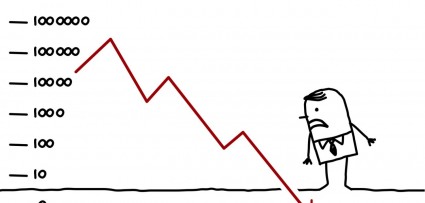November 2, 2015
By: Bobby Casey, Managing Director GWP

The first and most natural response to such a proposition is to withdraw your cash and get it out of that banking system. What if there was no cash? What if there was no physical form to your money anymore? The most you can do is transfer the data of your holdings in your account to another bank that does the exact same thing.
Such is the nightmare facing Sweden. Sweden is looking to become the first country with an entirely virtual monetary system AND negative interest rates. They decided to set and hold their benchmark interest rate at -0.35%, and rather than indulge an even lower interest rate, they took the quantitative easing route in the amount of 65 billion Swedish krona (or $7.64 billion) to 200 billion krona (or $23.5 billion) by June 2016. And they are prepared to do it again if necessary.
As of yet, the costs of negative interest rates have not adversely affected Swedes. But the banks can’t avoid that forever, so at some point it will trickle down.
There are three possible scenarios.
- Positive interest rates. Those come at a cost to the bank as they pay out the interest to their account holders. Of course they also make money on the interest.
- Zero interest rates. That’s pretty much a wash. Not making money, not losing money. No cost to the bank.
- Negative interest rates. That comes at a different cost to the bank. Rather than paying their account holders, they are paying for the privilege of holding deposits, and are no longer profiting off them. From here, there are two possible options:
- Offset that cost by passing it down to the account holders, which could result in a run on the bank; or
- Reduce the deposits you are holding by paying down existing debts. If spending money is the only alternative to a fee or fine, then spend they shall! And they have! And they continue to do so with the money they’ve seen from quantitative easing. In the US, we have fixed reserves mandated by the Federal Reserve. So banks are simply passing around the deposits to one another to avoid getting dinged.
While Sweden moves toward a digital monetary system to avoid a “run on the banks”, other countries are considering just discouraging withdrawals of cash and limiting them. The logical end, however, remains as banks ultimately refusing cash altogether. As it stands, Scandinavia has quite the reputation for believing cash transactions are suspicious and likely indicative of some sort of criminal behavior. Already, children have debit cards, homeless newspaper vendors and even churches take payment by card. So if only a nominal amount of transactions are done in cash, the assumption is, you’re not on the up and up.
Sounds a lot like the US and its suspicions of virtual currencies like Bitcoin and of cash itself.
More money, less cash, lower interest rates, and more spending: how is that cluster of behavior expected to result in anything other than disaster?
Sweden isn’t the only one imposing negative interest rates. Four European central banks – the ECB, SNB, Riksbank, and Denmark’s Nationalbank – have also instituted negative interest rate policies.
So this is what capital control mechanisms lead to? Banks taking money from savers’ accounts. Why does this sound so familiar? Where did we see this before in the past? Oh yes… CYPRUS. Granted this isn’t a bail-in for a collapsing banking system… YET. But this still punishes the fiscally responsible savers and banks that choose to remain somewhat capitalized. It is a central-banking mandate that people live at or beyond their means to prop up the economy.
This type of irresponsible encouragement from on high leads to financial crises such as the one we experienced in the US about 10 years ago. Economic engineering of this sort to preserve the image of prosperity, or compensate for something that might’ve fallen through, is not sound policy. In the case of the US, we are trying to make up for the fact that our treasuries aren’t in the same high demand ever since China stopped buying.
These policies are inevitably going to lead to capital fight. When countries wage war on wealth, you get economic refugees. It’s no different than physical wars. When people cannot tolerate the conditions, restrictions, and the threat to themselves, they leave.
Obviously, when full jurisdictions try to control anything, people instinctively look outside those jurisdictions for solutions. If you’re coming after my money, I get my money out and move it somewhere where they leave my money alone. If you’re going to tax my money, then I get my money into tax shelters. If you’re going to do away with money, and force me to either pay a fine or spend, then I’ll spend. That spending will either manifest itself as paying off debts, or just shifting my money to another store of wealth that doesn’t fine me such as precious metals and real estate.
If you could put the number of people who are economically fleeing their respective countries, it likely wouldn’t look much different than the images we see of the Syrians heading to Europe or the Mexicans heading for the United States.
Negative interest rates will not and have not stimulated economies. They scare economies, as would any other punitive measure or attack on property. You can absolutely find a better place to store your wealth. There are still plenty of options out there. For those who still think saving money is a fiscal virtue, let’s talk. Click here to schedule a consultation.

